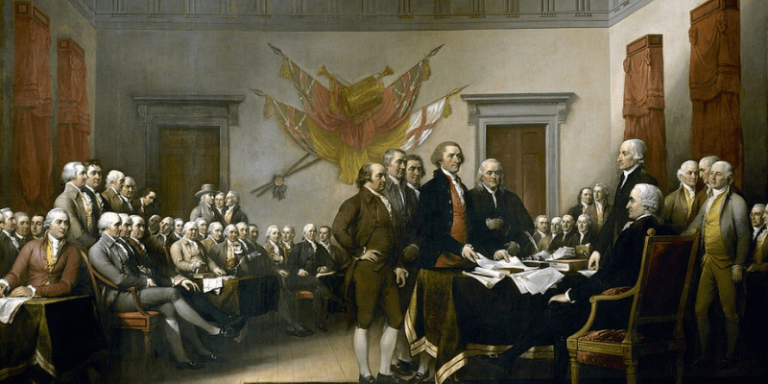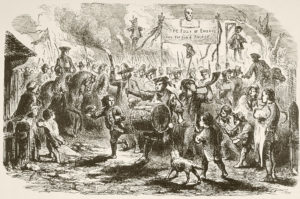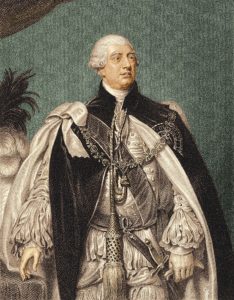Declaration of Independence: Freeing America from Foreign Rule
The Declaration of Independence is the first of our founding documents – the very beginning of freedom in America.
By: admin | July 4, 2024 | 609 Words

John Trumbull’s painting depicting the drafting committee of the Declaration of Independence presenting their work to the Congress. (Photo by Universal History Archive/Getty Images)
The United States of America is often called the land of the free, but that was not always the case. Long before there was the United States, explorers from Europe sailed across the Atlantic to America and set up colonies. Even though they were in the “New World,” these Europeans were still ruled by the countries from which they came.
There were many battles fought between the colonists of different countries, and against the Native Americans, who were already here when the Europeans arrived. By the mid-1700s, England controlled 13 colonies in what is now the Eastern United States. Those colonies were New Hampshire, Massachusetts, Connecticut, Rhode Island, New York, New Jersey, Pennsylvania, Delaware, Maryland, Virginia, North Carolina, South Carolina, and Georgia.

Stamp Act protests in New York, 1765. (Photo by Universal History Archive/Getty Images)
Eventually, the people of the British colonies in America grew tired of being ruled from across the ocean, and they declared their independence from England. It was these 13 colonies that formed the first states in the United States.
It All Began with Taxes
By 1765, England was suffering from a war with France and needed money. British Parliament started creating taxes the colonists had to pay. This began with the Stamp Act of 1765, which taxed paper documents in the colonies. The colonists didn’t feel Parliament had the right to tax them without their consent, and people began to get angry. Parliament ended the Stamp Act a year later but declared that it had the authority to create whatever laws it wanted for the colonies – and it passed many more laws the colonists didn’t like.

Portrait of King George III (Photo by Stock Montage/Getty Images)
Restore the Relationship or End It?
Each new tax inspired some rebellion in the colonies. When the colonists pushed back against the taxes, King George III sent troops to force them to obey the laws. Every time the colonists rejected a law, the king sent more soldiers to fight them. These Intolerable Acts, as the colonists began calling them, led to the First Continental Congress being formed in Philadelphia in 1774 to demand an end to taxation without representation. Since the colonists weren’t represented in Parliament, they couldn’t vote for or against the new taxes. They felt this was unfair, and that they should only have to pay if they had a say in the laws that affected them.
The conflict grew, but most colonists still saw themselves as loyal British subjects and hoped they could fix their relationship with the king.
But in 1775, King George denounced the colonies in front of Parliament and started building up his army and navy so that he could finally end the rebellion in the colonies by force. The colonists realized they would need help from other countries, especially France. They would have to officially break away from England to get that help.
Declaring Independence
In 1776, Thomas Jefferson wrote the first draft of the Declaration of Independence. The Second Continental Congress met to debate the document. After two days of discussion and editing, they voted to accept the final version that we know today, and the Declaration of Independence was adopted on July 4, 1776.
The Declaration united the colonists, which changed the nature of the war. They no longer hoped to fix things with King George III, and the Declaration contained a long list of complaints against the king. Now the colonists finally had a cause worth fighting for: freedom from foreign rule and the rights of life, liberty, and the pursuit of happiness for the people.
















